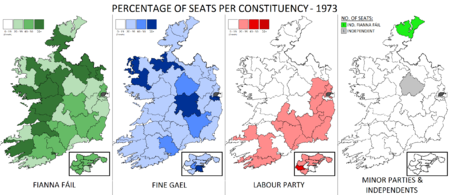1973 Irish general election
| |||||||||||||||||||||||||||||||||||||||||||||||||
143 of 144 seats in Dáil Éireann 73 seats were needed for a majority | |||||||||||||||||||||||||||||||||||||||||||||||||
|---|---|---|---|---|---|---|---|---|---|---|---|---|---|---|---|---|---|---|---|---|---|---|---|---|---|---|---|---|---|---|---|---|---|---|---|---|---|---|---|---|---|---|---|---|---|---|---|---|---|
| Turnout | 76.6% | ||||||||||||||||||||||||||||||||||||||||||||||||
| |||||||||||||||||||||||||||||||||||||||||||||||||
 Percentage of seats gained by each of the three major parties, and number of seats gained by smaller parties and independents. | |||||||||||||||||||||||||||||||||||||||||||||||||
| |||||||||||||||||||||||||||||||||||||||||||||||||
The Irish general election of 1973 was held on 28 February 1973. The newly elected 144 members of the 20th Dáil assembled at Leinster House on 4 March when the new Taoiseach and government were appointed.
The general election took place in 42 parliamentary constituencies throughout Ireland for 144 seats in the lower house of parliament, Dáil Éireann.
Campaign
By the time the general election was called in 1973, Fianna Fáil had been in power for almost sixteen consecutive years. During that period the party had seen three different leaders, Éamon de Valera, Seán Lemass and the current leader of the party, Jack Lynch. As a result of this, much of the electorate believed it was time for a change of government. Lynch had hoped to dissolve the Dáil in December 1972, however events conspired against him and the election was eventually called for February 1973.
While Fine Gael and the Labour Party had pursued their own opposition policies since 1957 they now realised that the only way to oust Fianna Fáil would be to join forces. Not long after the general election was called both parties agreed to a pre-election pact in order to fight the election together on the issues that united them. The National Coalition as it was known offered the electorate the first alternative credible government in many years.
While Fianna Fáil actually increased its percentage of the vote, it lost seats. The increase in the percentage was remarkable considering the party had been in power for so long, and also because of the "Arms Crisis". A clever use of transfers between the National Coalition parties in the single transferable vote system enabled a change of government to take place.
Coverage of the general election by the national broadcaster, Radio Telefís Éireann, also saw a unique event. Jack Lynch, in an interview with Brian Farrell on the programme, became the first Taoiseach to concede defeat live on Irish television. Although the full result was not known Lynch was certain that the transfers to other candidates would result in Fianna Fáil losing the general election.
Court case
The Fourth Amendment of the Constitution, approved at referendum in December 1972 and signed into law in January 1973, had reduced the voting age from 21 to 18.[1][2] However, the electoral register would not be updated until 15 April, five weeks after the election date.[1][3] A 20-year-old student, represented by Seán MacBride, asked the High Court to postpone the election to vindicate his right to vote.[1] He lost his case, although he was awarded his costs due to its "public importance".[1]
Result
| Election to the 20th Dáil – 28 February 1973[4][5][6] | ||||||||
|---|---|---|---|---|---|---|---|---|
| Party | Leader | Seats | ± | % of seats |
First pref. votes |
% FPv | ±% | |
| Fianna Fáil | Jack Lynch | 69 | –6 | 47.9 | 624,528 | 46.2 | +1.5 | |
| Fine Gael | Liam Cosgrave | 54 | +4 | 37.5 | 473,781 | 35.1 | +1.0 | |
| Labour | Brendan Corish | 19 | +1 | 13.2 | 184,656 | 13.7 | –3.3 | |
| Official Sinn Féin | Tomás Mac Giolla | 0 | New | 0 | 15,366 | 1.1 | – | |
| Aontacht Éireann | Kevin Boland | 0 | New | 0 | 12,321 | 0.9 | – | |
| Communist | 0 | 0 | 0 | 466 | 0.0 | – | ||
| Independent | N/A | 2 | +1 | 1.4 | 39,419 | 2.9 | –0.3 | |
| Spoilt votes | 15,937 | — | — | |||||
| Total | 144 | 0 | 100 | 1,366,474 | 100 | — | ||
| Electorate/Turnout | 1,783,604 | 76.6% | — | |||||
- Fine Gael–Labour Party coalition government formed.
First time TDs
The following 22 TDs were elected for the first time:
- Liam Ahern
- Joseph Bermingham
- Ruairí Brugha
- Ray Burke
- Johnny Callanan
- Seán Calleary
- Brendan Daly
- John Esmonde
- Joseph Farrell
- Denis Gallagher
- Brendan Griffin
- Patrick Hegarty
- John Kelly
- Jimmy Leonard
- Charles McDonald
- Ciarán Murphy
- Fergus O'Brien
- John Ryan
- Myles Staunton
- Seán Walsh
- James White
- John Wilson
By-elections
Outgoing TDs
- Frank Aiken (Retired)
- Terence Boylan (Lost seat)
- Michael Hilliard (Lost seat)
- John O'Donovan (Lost seat)
- Micheál Ó Móráin (Lost seat)
See also
References
- ^ a b c d Ferriter, Diarmaid (2012-11-01). Ambiguous Republic: Ireland in the 1970s. Profile Books. pp. 94–95. ISBN 9781847658562. Retrieved 30 March 2014.
- ^ "Fourth Amendment of the Constitution Act, 1972". Irish Statute Book. Retrieved 30 March 2014.
- ^ "S.I. No. 169/1963 - Registration of Electors and Juries Acts (Specification of Dates) Regulations, 1963". Irish Statute Book. p. §4(3). Retrieved 30 March 2014.
{{cite web}}: Invalid|nopp=Y(help); Unknown parameter|nopp=ignored (|no-pp=suggested) (help) - ^ "20th Dáil 1973 General Election". ElectionsIreland.org. Retrieved 18 June 2009.
- ^ "Dáil elections since 1918". ARK Northern Ireland. Retrieved 18 June 2009.
- ^ Nohlen, D & Stöver, P (2010) Elections in Europe: A data handbook, pp1009-1017 ISBN 978-3-8329-5609-7
